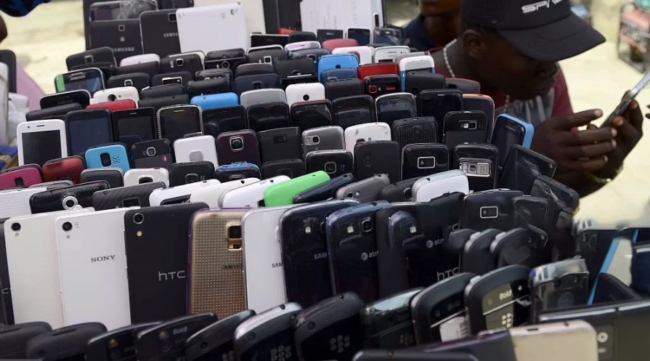The Nigerian Communications Commission (NCC) says it will deploy a device management system (DMS) that will automatically capture subscribers’ international mobile equipment identity (IMEI).
On May 6, 2021, President Muhammadu Buhari launched the revised national identity policy for SIM card registration in Abuja, following the launch of the first edition in February 2020.
During the event, Buhari said the synchronisation exercise will provide a digital framework for improving security and strengthening of the economy.
He maintained that proper identification of all Nigerians and legal residents in the country and the ability to conveniently access a database would provide the impetus for more effective planning and security oversight.
Advertisement
Buhari also directed that the DMS be implemented within three months.
TheCable takes a deep dive into what the IMEI automatic capture means for subscribers.
How the Device Management System will work
Advertisement
The device management system (DMS) is a centralised equipment identity register (CEIR) that will serve as a repository for keeping records of all registered mobile phones’ international mobile equipment identity (IMEI) and owners of such devices.
IMEIs that have been reported as either stolen or illegal will be shared through the DMS to all the operators and service providers. The purpose is to ensure that such devices do not work even if different SIM Cards are inserted in those devices.
The DMS will also provide access to all operators to cross-check the IMEIs and their status before allowing a device to become active on their network.
Also registered mobile phone technicians will be provided with an interface to check IMEIs and ensure it has not been reported as stolen or illegal before they render their technical services.
Advertisement
The NCC will be responsible for the implementation and management of the DMS to achieve the policy objectives.
How does this benefit subscribers?
Some of the objectives of implementing the DMS include: to ensure that every reported IMEIs for stolen and illegal mobile phones and other smart devices are blacklisted and shared with all operators across all networks; to ensure all un-registered devices do not work in any of the Networks in Nigeria.
Also to mitigate mobile phone theft and protect Nigerians from been attacked to snatch their mobile phones and other smart devices; to blacklist and render all stolen mobile phones and other smart devices valueless in the Nigerian mobile phones market; it will also help to ease the use of mobile phones and other smart devices in all public places without fear of been attacked by mobile phone snatchers.
Advertisement
Countries that have implemented IMEI registration
With this new policy, Nigeria is joining the list of nations that have implemented IMEI registration. These countries include Azerbaijan, Cambodia, Chile, Columbia, Indonesia, Iran, Pakistan, Thailand, Turkey, and Lebanon.
Advertisement
Recently, the telecommunication regulatory authority of Afghanistan banned the import of cellphones that lack registration and IMEI code, in order to “enhance national security.”
In 2019, there were reports of how Saudi Arabia tracked down women who fled the country over abuse of rights using their cell phone IMEI.
Advertisement
Divergent opinions on the DMS implementation
You can go back to your carrier and report the phone will be blacklisted for you.
If you try to sell the phone to someone the buyer will ask you for the IMEI of the phone and when they run a check on it if the phone is a stolen the IMEI will indicate.
Just like this👇 pic.twitter.com/Ak53m6lHbDAdvertisement— Duke of the BUJ👑 (@DukeofAbuja1) May 21, 2021
Is there any precedent anywhere in the world of countries asking for IMEI of their citizens' phones? https://t.co/SgrDrPAQcT
— Mark Amaza (@amasonic) May 21, 2021
A digital rights organisation, Paradigm Initiative (PIN), in a series of tweets on Friday condemned the new policy, saying the approach puts Nigerians at more risk.
“A country that does not have data protection laws and has a terrible personal data abuse record should NOT be asking for citizens’ International Mobile Equipment Identity (IMEI) numbers,” Paradigm Initiative tweeted.
Tomiwa Ilori, a doctoral researcher, Centre for Human Rights, University of Pretoria, said the collection of IMEIs by the government does not comply with both international human rights law which Nigeria has obligations to comply with and its Constitution.
“Currently, Nigeria does not have a comprehensive and primary law on data protection. It also does not have a substantive law passed directly by the National Assembly on lawful interception of communications. These are the horses that are supposed to be before the cart of communications interception or data collection. What this is, at best is an overdrive and a misplaced priority.”
Adeboye Adegoke, a digital rights expert, described the request as an enormous power that can lead to dictatorship.
He said the information government is seeking is already available with the telcos.
“The government is taking so much from the people under the disguise of security. They have done NIN, linking of SIM to NIN, BVN etc. The right to privacy is provided for in the constitution – Section 37. Though, there are circumstances for limitations, there is a caveat that guides such provisions.”





